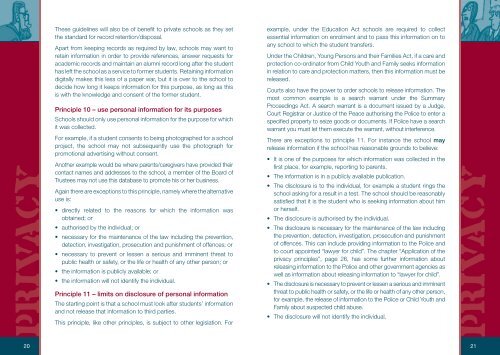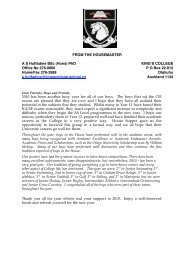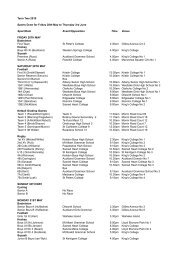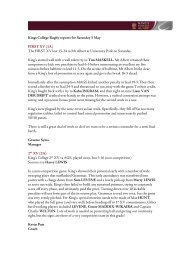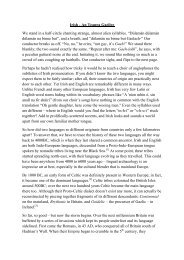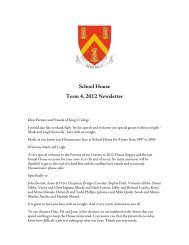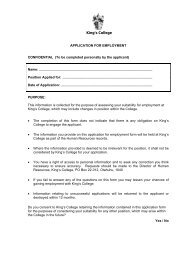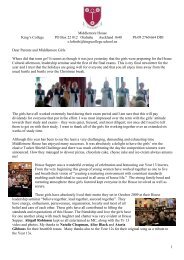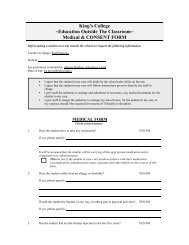Privacy in Schools - Office of the Privacy Commissioner
Privacy in Schools - Office of the Privacy Commissioner
Privacy in Schools - Office of the Privacy Commissioner
Create successful ePaper yourself
Turn your PDF publications into a flip-book with our unique Google optimized e-Paper software.
10<br />
PRIVACY<br />
<strong>Privacy</strong> pr<strong>in</strong>ciples<br />
The backbone <strong>of</strong> <strong>the</strong> <strong>Privacy</strong> Act is <strong>the</strong> 12 privacy pr<strong>in</strong>ciples. It is to<br />
<strong>the</strong>se pr<strong>in</strong>ciples that you should turn when deal<strong>in</strong>g with:<br />
• collection <strong>of</strong> personal <strong>in</strong>formation;<br />
• storage <strong>of</strong> personal <strong>in</strong>formation;<br />
• use <strong>of</strong> personal <strong>in</strong>formation;<br />
• disclosure <strong>of</strong> personal <strong>in</strong>formation; and<br />
• access to and correction <strong>of</strong> personal <strong>in</strong>formation.<br />
This chapter summarises and expla<strong>in</strong>s <strong>the</strong> 12 privacy pr<strong>in</strong>ciples. The<br />
full text <strong>of</strong> <strong>the</strong> pr<strong>in</strong>ciples is set out <strong>in</strong> Appendix A, page 38.<br />
You will see that although <strong>the</strong>re are 12 pr<strong>in</strong>ciples, <strong>the</strong>re are a number<br />
<strong>of</strong> exceptions to <strong>the</strong> pr<strong>in</strong>ciples which make <strong>the</strong>m guidel<strong>in</strong>es to <strong>the</strong><br />
implementation <strong>of</strong> <strong>the</strong> <strong>Privacy</strong> Act ra<strong>the</strong>r than rigid statements <strong>of</strong> law.<br />
One important exception to <strong>the</strong> pr<strong>in</strong>ciples is that <strong>the</strong> <strong>Privacy</strong> Act is<br />
subject to all o<strong>the</strong>r legislation. Therefore your obligations under <strong>the</strong><br />
Education Act must be met before you consider <strong>the</strong> <strong>Privacy</strong> Act. For<br />
example, all schools are required to comply with <strong>the</strong> requirements for<br />
enrolment records under <strong>the</strong> Education Act and all schools are required<br />
to report any expulsion to <strong>the</strong> M<strong>in</strong>istry <strong>of</strong> Education. It is anticipated<br />
that <strong>in</strong> 2010, primary and <strong>in</strong>termediate schools will be required to report<br />
to parents on how <strong>the</strong>ir child is do<strong>in</strong>g aga<strong>in</strong>st new National Standards<br />
<strong>in</strong> read<strong>in</strong>g, writ<strong>in</strong>g and maths.<br />
If you have any questions about <strong>the</strong> pr<strong>in</strong>ciples or if you wish to make a<br />
compla<strong>in</strong>t <strong>the</strong>n you should contact <strong>the</strong> Offi ce <strong>of</strong> <strong>the</strong> <strong>Privacy</strong><br />
<strong>Commissioner</strong>. For contact details, see page 37 and <strong>the</strong> <strong>Commissioner</strong>’s<br />
website, www.privacy.org.nz.<br />
Pr<strong>in</strong>ciple 1 – only collect <strong>in</strong>formation that you need to have<br />
When collect<strong>in</strong>g personal <strong>in</strong>formation about students, <strong>the</strong>ir parents,<br />
caregivers, or families, you must be sure you are collect<strong>in</strong>g it for lawful<br />
purposes <strong>of</strong> <strong>the</strong> school and <strong>the</strong> <strong>in</strong>formation is necessary for those<br />
purposes.<br />
So what are lawful purposes <strong>of</strong> a school<br />
It is perhaps easiest to defi ne lawful purposes as those that are not<br />
unlawful. So, for example, if a purpose is to breach <strong>the</strong> anti discrim<strong>in</strong>ation<br />
obligations <strong>of</strong> <strong>the</strong> Human Rights Act or <strong>the</strong> purpose is for crim<strong>in</strong>al<br />
activity, <strong>the</strong>n obviously nei<strong>the</strong>r <strong>of</strong> <strong>the</strong>se will be a lawful purpose.<br />
The more challeng<strong>in</strong>g aspect to pr<strong>in</strong>ciple 1 is identify<strong>in</strong>g when it is<br />
necessary to collect <strong>the</strong> <strong>in</strong>formation.<br />
A good start<strong>in</strong>g po<strong>in</strong>t is <strong>the</strong> teach<strong>in</strong>g pr<strong>of</strong>ession’s ethical code.<br />
At <strong>the</strong> date <strong>of</strong> this publication, <strong>the</strong> New Zealand Teachers Council Code<br />
<strong>of</strong> Ethics describes <strong>the</strong> goal or purpose <strong>of</strong> teach<strong>in</strong>g which is to atta<strong>in</strong> <strong>the</strong><br />
highest standards <strong>of</strong> pr<strong>of</strong>essional service <strong>in</strong> <strong>the</strong> promotion <strong>of</strong> learn<strong>in</strong>g.<br />
The Code also recognises that this complex pr<strong>of</strong>essional task is<br />
undertaken <strong>in</strong> collaboration with colleagues, learners, parents/guardians<br />
and family/whānau, as well as with members <strong>of</strong> <strong>the</strong> wider community.<br />
Ano<strong>the</strong>r document to consider is <strong>the</strong> school’s charter or strategic plan<br />
that identifi es <strong>the</strong> school’s mission (vision or purpose), aims, objectives,<br />
directions, and targets toge<strong>the</strong>r with its values or pr<strong>in</strong>ciples (kaupapa<br />
and tikanga). From <strong>the</strong>re, <strong>the</strong> school needs to identify what it needs to<br />
know about students and <strong>the</strong>ir families to meet those purposes.<br />
A good approach for schools is to consider whe<strong>the</strong>r or not <strong>the</strong><br />
<strong>in</strong>formation is needed to complete a process such as enrolment or an<br />
application to attend a school camp. If so, <strong>the</strong>n <strong>the</strong> school probably<br />
needs to collect <strong>the</strong> <strong>in</strong>formation. A fur<strong>the</strong>r check is to see if o<strong>the</strong>r<br />
schools are collect<strong>in</strong>g <strong>the</strong> same <strong>in</strong>formation <strong>in</strong> <strong>the</strong> same<br />
circumstances.<br />
An obvious example is a student’s home address. That <strong>in</strong>formation will<br />
be necessary to complete <strong>the</strong> enrolment process and it is <strong>in</strong>formation<br />
collected by o<strong>the</strong>r schools.<br />
To give ano<strong>the</strong>r example, some schools set <strong>the</strong> celebration <strong>of</strong><br />
achievement as part <strong>of</strong> <strong>the</strong>ir vision. That value may mean that one <strong>of</strong><br />
<strong>the</strong> purposes for collect<strong>in</strong>g <strong>in</strong>formation is <strong>the</strong> identifi cation <strong>of</strong> a student<br />
(maybe with a photograph) and <strong>the</strong> publication <strong>of</strong> that student’s results<br />
or o<strong>the</strong>r success as part <strong>of</strong> <strong>the</strong> celebration <strong>of</strong> achievement. In that<br />
scenario, can a school ask for a photograph or consent to use<br />
a photograph<br />
PRIVACY<br />
11


